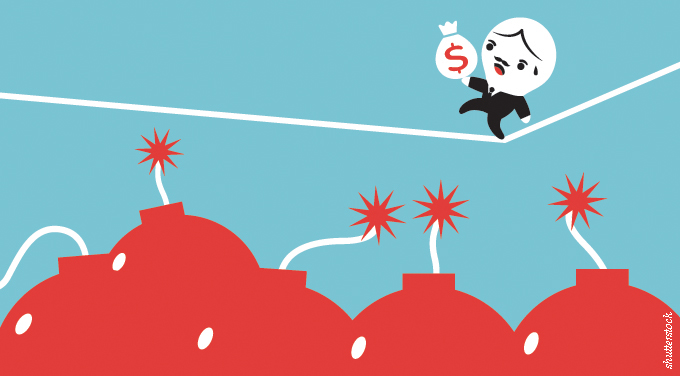Shadow bankers are no match for the central bank when it comes to throwing China’s financial system into a panic. Back-alley lenders have handed out a mere US$4 trillion in cash at exorbitant interest rates. No surprises here. The People’s Bank of China (PBOC), on the other hand, managed to send shock waves through the banking system and push markets into turmoil twice last year.
“We believe central banking, instead of shadow banking, is a major risk to China’s economic and financial stability in 2014,” Bank of America Merrill Lynch said in a note this week.
That’s because PBOC is walking a tightrope with a cash crunch on one side and highly leveraged banks on the other. If the central bank pumps cash into money markets, speculative lending will grow. Yet, when it keeps its hand off the printing press, bankers, businesses and investors writhe in pain.
It happened twice in 2013; in June and at the end of last month. Short-term interbank rates shot sky high. In the first instance, rumors spread that customers couldn’t withdraw their cash from banks. The stock market dropped to a four-year low.
The policy on tightening, which has targeted short-term lending rates, is doing more than spooking investors. Analysts might call the central bank a threat to stability but PBOC is intent on curbing some of the bad practices inherent in the country’s financial sphere.
For one, higher short-term interbank rates are laying bare some of the structural problems in China’s banking industry.
Small lenders have a bad habit of short-term borrowing from other banks in order to provide longer-term loans to customers. The problem becomes increasingly obvious when rates such as that on seven-day bond repurchases climb a few percentage points, as they did at the end of December.
That results in what HSBC Research calls a “worsening duration mismatch between liabilities and assets.” In other words, banks are paying high short-term interest on money they borrow but taking in lower returns on long-term loans. That will squeeze their margins, HSBC said in a note.
At the same time, the higher rates are pushing China’s banks toward riskier lending. The higher the interbank rate climbs, the greater return banks will need on loans, pushing them to lend to borrowers that will pay higher interest for the money.
“As these [interbank] rates creep higher, banks will have a rising incentive to seek out higher-return –ie, riskier, but more productive – borrowers for their marginal loans,” GavKal Dragonomics, a Hong Kong-based research firm, said in a note this week.
Risky isn’t always bad. Riskier borrowers are often new companies in need of capital. One of China’s explicit goals for reform is to channel financing to small and medium companies, a group that has traditionally been ignored by banks but is responsible for the bulk of new job creation.
For the bad rap PBOC gets, it’s doing a swell job. By targeting short-term interbank rates, it’s hitting the real estate projects and highly leveraged investment products – all things speculative – that thrive on cheap, short-term rates. It’s also coming down hard on financing long-term loans with money borrowed at high, short-term rates – a fundamentally poor banking practice.
The central bank doesn’t have its sights on the costs of longer-term borrowing, which tends to finance the real economy. “Such a focused strategy suggests that the impact on corporate investment this time will be less severe than after the rate increases of 2011, which were followed by a significant growth slowdown in 2012,” GavKal Dragonomics said earlier this month.
HSBC projects credit will grow at 13% this year, which is enough to support annual GDP growth of 7.5%, a likely government target for growth.
Analysts say be prepared for more, smaller shocks to liquidity as the central bank makes this rocky transition from focusing on the amount of money in the market to the cost of borrowing that money. It’s set to be a rough ride.
